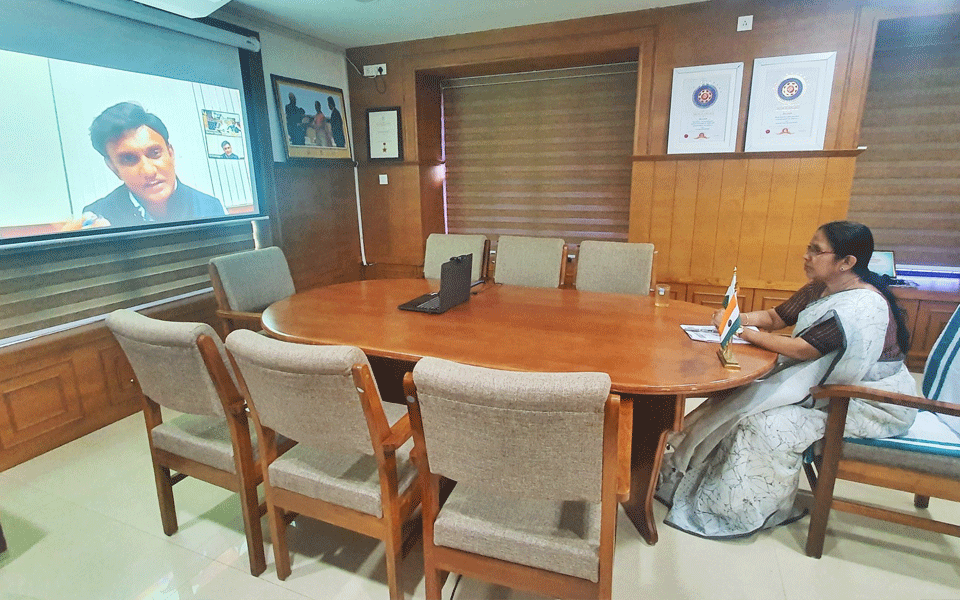Bengaluru: Karnataka and Kerala on Monday discussed the measures taken to contain coronavirus and stressed on sharing information to control the disease besides quality treatment for patients.
Through video conference, Karnataka Medical Education Minister D K Sudhakar spoke to the Kerala Health Minister K K Shailaja and discussed the steps adopted for tracing, testing and treatment of the disease, the outcome, and measures to be taken to address the challenges following easing of lockdown restrictions, an official release said.
They discussed control and treatment practices adopted to fight COVID-19 and shared details in their 50-minute conversation. The two ministers agreed to have regular dialogue to exchange information on disease control and quality treatment for patients.
Explaining the steps taken for better management of COVID-19, Shailaja said that soon after students returned from Wuhan, Kerala had taken proper precautions to prevent spread of the virus.
The press note quoted Shailaja as saying that Kerala is equipped with health facilities at Taluk level and it became easier for the state to quarantine the infected and treat them at various levels.
This has reduced the mortality rate in Kerala, she added.
Shailaja said 'Asha' workers have been playing a key role in breaking the chain of infection. In addition to it, the police are taking action to prevent people from coming in contact with infected people.
She appreciated the measures taken by Karnataka and emphasised on its assistance too, the release said.
Let the Truth be known. If you read VB and like VB, please be a VB Supporter and Help us deliver the Truth to one and all.
Panaji (PTI): As part of a crackdown against tourist establishments violating laws and safety norms in the aftermath of the Arpora fire tragedy, Goa authorities on Saturday sealed a renowned club at Vagator and revoked the fire department NOC of another club.
Cafe CO2 Goa, located on a cliff overlooking the Arabian Sea at Vagator beach in North Goa, was sealed. The move came two days after Goya Club, also in Vagator, was shut down for alleged violations of rules.
Elsewhere, campaigning for local body polls, AAP leader Arvind Kejriwal said the fire incident at Birch by Romeo Lane nightclub at Arpora, which claimed 25 lives on December 6, happened because the BJP government in the state was corrupt.
An inspection of Cafe CO2 Goa by a state government-appointed team revealed that the establishment, with a seating capacity of 250, did not possess a no-objection certificate (NOC) of the Fire and Emergency Services Department. The club, which sits atop Ozrant Cliff, also did not have structural stability, the team found.
The Fire and Emergency Services on Saturday also revoked the NOC issued to Diaz Pool Club and Bar at Anjuna as the fire extinguishers installed in the establishment were found to be inadequate, said divisional fire officer Shripad Gawas.
A notice was issued to Nitin Wadhwa, the partner of the club, he said in the order.
Campaigning at Chimbel village near Panaji in support of his party's Zilla Panchayat election candidate, Aam Aadmi Party leader Kejriwal said the nightclub fire at Arpora happened because of the "corruption of the Pramod Sawant-led state government."
"Why this fire incident happened? I read in the newspapers that the nightclub had no occupancy certificate, no building licence, no excise licence, no construction licence or trade licence. The entire club was illegal but still it was going on," he said.
"How could it go on? Couldn't Pramod Sawant or anyone else see it? I was told that hafta (bribe) was being paid," the former Delhi chief minister said.
A person can not work without bribing officials in the coastal state, Kejriwal said, alleging that officers, MLAs and even ministers are accepting bribes.





